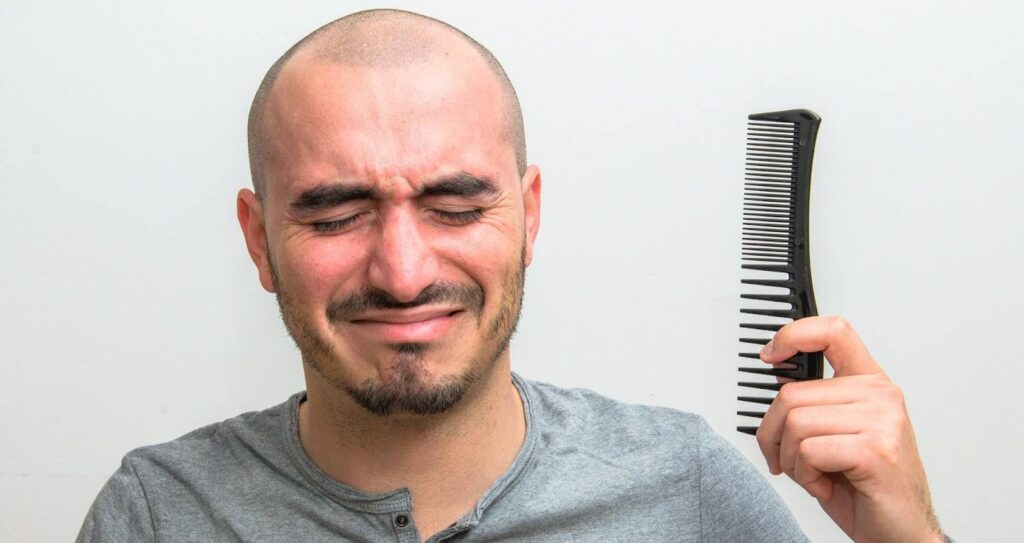Hair is a defining feature for many of us, holding significant value in our lives. We may have memories of the hairstyles we yearned for in our teenage years or the fear we felt when we noticed premature gray hairs. For many men, hair loss is common as the years go on. These changes seem beyond our control, making it hard to cope. Men who experience unwanted hair loss often feel like they lost the genetic lottery. This is where Nashville Hair Doctor can help. We understand the emotional impact of hair loss on self-esteem. We also understand the frustration that comes with hair loss from genetics. Our Tennessee-based clinic specializes in Follicular Unit Extraction (FUE) hair transplants, which could be the solution you’ve been searching for. But before we delve into the transformative power of FUE, let’s explore the intricate connection between genetics and hair loss.
Genetics and Hair Loss: What to Know
The Basics of Hair Loss: Causes, Treatments, and Available Options
Hair loss is a common and complex issue that affects men of all ages. For those wondering whether hair loss is genetic, the answer is that it can be. Understanding the root causes of hair loss is the first step toward finding effective solutions. Here are some common causes of hair loss in men:
- Genetics, which plays a significant role in male pattern baldness
- Hormonal changes, such as those that occur during puberty and aging
- Certain medications like chemotherapy drugs, blood thinners, and antidepressants
- Lifestyle factors like stress, unhealthy diets, and poor sleep
Hair loss can be frustrating and challenging for men, but it’s important to remember that effective solutions are available. Many men stick to topical medications or oral supplements, while others embrace their thinning hair with a shaved head. At Nashville Hair Doctor, we offer the FUE hair transplant method for those who want their hair back. In this innovative and comprehensive approach, healthy hair follicles are extracted by a hair restoration specialist from a donor area (usually the back of the scalp) and then implanted into the balding areas of the head. This ensures that healthy hair resistant to hair loss will integrate across your head over time, yielding a natural-looking result.
Types of Hair Loss and How to Identify Each Type
Hair loss comes in various forms, and identifying the specific type is vital for effective treatment. Each condition requires a tailored approach. Here are some common types of hair loss in men:
- Male Pattern Baldness (MPB): MPB is the most common type of genetic hair loss in males. It typically begins with a receding hairline and hair loss on the crown of the head, and gradually progresses over time. A combination of genetics and hormones causes this type of hair loss.
- Alopecia Areata: This autoimmune disorder impacts individual hair follicles, causing hair loss on the scalp and other body areas. It can occur at any age and may flare up because of stress or illness.
- Telogen Effluvium: This temporary form of hair loss occurs when many hair follicles simultaneously enter the hair growth cycle’s resting (telogen) phase. Several factors, including physical or emotional stress, illness, medications, or hormonal changes, cause it.
- Traction Alopecia: This hair loss is caused by constant tension or pulling on the hair, often due to tight hairstyles such as braids. It typically affects the hairline or areas around the ears.
As you can see, some hair loss types are genetic, and some are environmental. At Nashville Hair Doctor, our team of skilled specialists can help you identify the type of hair loss you’re experiencing. With this knowledge, we can determine the most suitable course of action: non-surgical treatments or the transformative FUE Hair Transplant.
Genetics and Hair Loss: The Role That Genetics Plays
For those wondering whether hair loss is genetic — the answer in many cases is yes. Genetics can significantly influence hair loss in men. The genetic makeup inherited from our parents plays a role in our susceptibility to hair loss. Male Pattern Baldness is the most common hair loss type caused by genetics.
According to a National Library of Medicine study, male pattern baldness is linked to genes inherited by the biological mother. A study of over 12,000 men found that “…those with the gene had more than twice the risk of developing male pattern baldness.” However, it’s not fair to pinpoint your mother as the culprit for your hair loss. Another study from the National Library of Medicine found “…63 genes that may play a role in male pattern baldness,” while the X chromosome from the biological mother only holds 6 of those genes. Also, research from Healthline has found that “more than 80 percent of people experiencing noticeable balding had a father who also lost their hair.”
So, to answer the question, “Is hair loss inherited from mother or father?” The answer is unclear, as both parents’ genetics seem to contribute. Hair loss can be a common problem for many men, and it can often leave them feeling unsure about how to deal with it. This may be a genetic issue if you have a family history of hair loss. However, the good news is that understanding the genetic component of hair loss can help you take proactive steps to address it.
FUE Hair Transplants as a Solution
No matter the reason for your hair loss, it’s okay to admit that you want to reverse the signs. Many wonder, “Can you prevent hair loss if it’s genetic?” and the answer is that it’s rarely possible. Hair restoration, on the other hand, is becoming more possible every day. At Nashville Hair Doctor, we utilize the FUE hair transplant method to help men regain their hair. Unlike traditional hair transplant methods, FUE involves extracting individual hair follicles from donor areas and implanting them where needed. Our skilled technicians at Nashville Hair Doctor specialize in this minimally invasive procedure, ensuring natural-looking results without the telltale signs of a transplant. This technique is not just about restoring hair; it’s about restoring confidence and reclaiming a vital aspect of your identity.
The relationship between genetics and hair loss is intricate and multifaceted. However, armed with the proper knowledge and solutions, you can take charge of your hair’s fate. If you’re ready to say goodbye to hair loss worries, contact Nashville Hair Doctor for a free quote. We’ll get back to you within one business day with a hair restoration plan and price quote. Also, check out our before and after images that show the dramatic results we’ve achieved for countless people. Count on Nashville Hair Doctor to be your partner on the journey to a more confident and fuller you.

